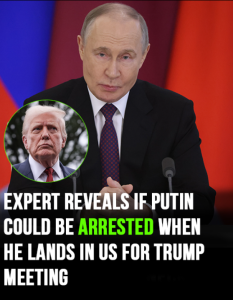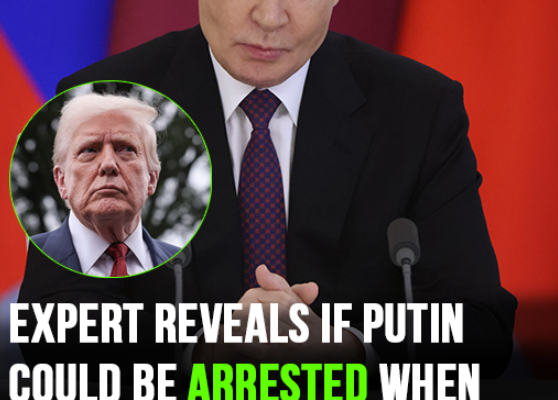Could Vladimir Putin Be Arrested if He Lands in the United States? Experts Explain the Legal and Political Reality
The International Criminal Court (ICC) made global headlines in March 2023 when it issued an arrest warrant for Russian President Vladimir Putin. The warrant accused him of personal responsibility for the unlawful deportation and transfer of Ukrainian children from occupied areas to Russia—acts classified as war crimes under the Rome Statute, the treaty that established the ICC. This marked one of the rare occasions where a sitting leader of a major global power was targeted by such an order. The move raised a provocative question: what would happen if Putin set foot in a country like the United States? Could he be arrested on the spot?
The short answer, according to legal experts and diplomatic analysts, is almost certainly no. The reasoning has less to do with the merits of the ICC case and more to do with the complex interplay of U.S. law, diplomatic immunity, and political considerations.
The ICC Warrant and What It Means
The ICC operates as a court of last resort, intended to prosecute individuals accused of genocide, crimes against humanity, war crimes, and the crime of aggression. It has jurisdiction over crimes committed in the territories of its 124 member states, as well as crimes referred to it by the United Nations Security Council. However, its reach is limited. The court does not have its own police force; it depends entirely on the cooperation of states to execute arrest warrants.
Putin’s case is unusual in scale and politics. Russia is not a party to the Rome Statute and rejects the ICC’s authority outright. The same is true of the United States, which signed the treaty under President Bill Clinton in 2000 but withdrew its signature under President George W. Bush in 2002 before ratification. Washington has since maintained a policy of non-cooperation with the ICC, sometimes even expressing hostility toward its investigations. This means that, from a purely legal standpoint, the U.S. has no treaty-based obligation to arrest Putin for the ICC.
U.S. Domestic Law and International Obligations
Because the United States is not an ICC member, the Rome Statute does not bind it. Arresting a sitting head of state under an ICC warrant would require domestic legal authority, such as a U.S. law implementing ICC cooperation, which does not exist. Without such authority, any attempt to arrest Putin for ICC charges would face immediate legal challenges in American courts.
There is also the issue of diplomatic immunity. Under the Vienna Convention on Diplomatic Relations and customary international law, heads of state enjoy immunity from arrest in foreign states during official visits. This immunity is broad and covers both official and personal acts while in office. While the ICC claims that immunity does not shield leaders from its jurisdiction, that principle only applies if a state has agreed to the court’s authority or if the UN Security Council has mandated cooperation. Neither condition applies to the U.S. in Putin’s case.
The Political Dimension
Even if the legal barriers could somehow be overcome, the political consequences of arresting a foreign leader like Putin on American soil would be staggering. Such an action would almost certainly trigger a severe diplomatic crisis with Russia, potentially escalating to direct confrontation. In addition to damaging bilateral relations, it could destabilize ongoing diplomatic efforts in other areas, from arms control to regional security.
Historically, nations have been reluctant to enforce ICC warrants against sitting heads of state, even when they are members of the court. Sudan’s former president Omar al-Bashir traveled to multiple ICC member countries without arrest, despite being wanted for genocide in Darfur. These states often cited concerns about regional stability, political retaliation, or the difficulty of executing such a politically sensitive arrest.
Venue Selection and Practical Safeguards
When Putin has traveled abroad since the ICC warrant was issued, his destinations have been carefully chosen to avoid legal risks. He has visited countries that are either not members of the ICC or have made it clear they would not enforce the warrant. This same logic would apply to the United States. In fact, if Putin were invited for talks with American leaders, the venue might be selected specifically to limit legal exposure—similar to the way meetings between high-level officials sometimes take place in neutral territories or in settings that avoid problematic jurisdictions.
An example can be seen in the recent diplomatic event scheduled in Alaska. The choice of location was no accident. Alaska, as part of the U.S., is not under ICC jurisdiction, and U.S. law does not require enforcement of ICC warrants. This meant Putin could attend without fear of legal detention, while still meeting on relatively neutral ground geographically between Russia and the continental United States.
Could Anything Change That?
Theoretically, Congress could pass legislation allowing for cooperation with the ICC in certain cases, or the U.S. could enter into a specific agreement to enforce the court’s orders. However, such a move would be politically contentious, especially given longstanding skepticism toward the ICC in American politics. Some lawmakers fear that ICC jurisdiction could one day be used against U.S. military personnel or political leaders.
Another pathway would be for the United Nations Security Council to pass a resolution requiring all states to cooperate with the ICC in a specific case. But as a permanent member of the Council, Russia would almost certainly veto any resolution that targeted its own leadership.
Universal Jurisdiction as an Alternative
A different legal concept, known as universal jurisdiction, allows national courts to prosecute certain grave crimes—such as war crimes or crimes against humanity—regardless of where they were committed and regardless of the nationality of the accused or victims. Some countries have used this principle to pursue cases against foreign leaders. However, U.S. courts have been cautious in applying universal jurisdiction, and there is no precedent for it being used to arrest a sitting foreign head of state visiting the country. Attempting to do so in Putin’s case would invite complex legal challenges and massive diplomatic fallout.
Expert Consensus
Most international law scholars agree that while the ICC warrant is symbolically significant, it is unlikely to lead to Putin’s arrest unless he travels to a country that is both a member of the ICC and willing to enforce the warrant. In the United States, the absence of a legal obligation, combined with the protections of diplomatic immunity and the potential for political upheaval, make such an arrest virtually impossible under current conditions.
Symbolism vs. Enforcement
The ICC warrant against Putin sends a message to the world: even the most powerful leaders can face legal accountability for their actions. However, without the cooperation of major powers like the United States, China, and Russia, the court’s ability to enforce its orders is limited. In practice, the warrant restricts Putin’s travel options, shapes diplomatic negotiations, and adds a layer of political cost to his international engagements—but it does not create a direct risk of arrest in non-member states.
Conclusion
If Vladimir Putin were to land in the United States tomorrow, the likelihood of him being arrested on the ICC warrant is close to zero. The United States is not an ICC member and has no legal obligation to enforce the court’s orders. Diplomatic immunity for sitting heads of state, combined with the political and strategic consequences of such an action, makes arrest virtually inconceivable. The reality is that the ICC’s warrant functions more as a political and symbolic tool than as an enforceable threat in countries that do not recognize its jurisdiction. Unless the legal and political landscape changes dramatically, Putin will remain beyond the ICC’s reach on U.S. soil, even if the allegations against him continue to define his legacy in the court of global opinion.


